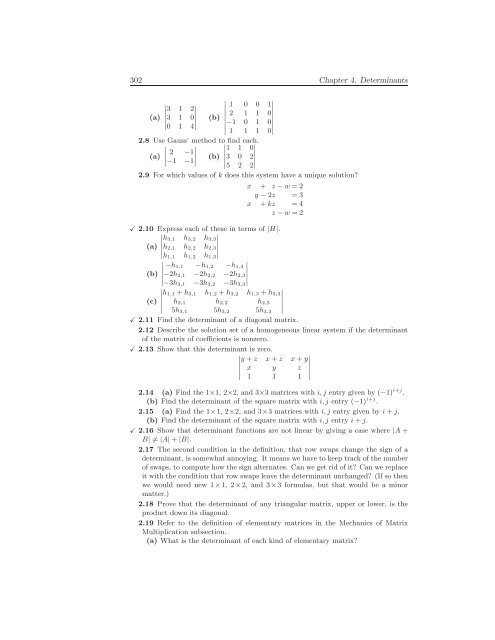- Page 1 and 2:
� � � �1 2� � �3 1�
- Page 3 and 4:
Preface In most mathematics program
- Page 5 and 6:
dent projects for individuals or sm
- Page 7 and 8:
Contents 1 Linear Systems 1 1.I Sol
- Page 9:
5.II.1 Definition and Examples ....
- Page 12 and 13:
2 Chapter 1. Linear Systems To fini
- Page 14 and 15:
4 Chapter 1. Linear Systems Conside
- Page 16 and 17:
6 Chapter 1. Linear Systems the sec
- Page 18 and 19:
8 Chapter 1. Linear Systems Don’t
- Page 20 and 21:
10 Chapter 1. Linear Systems 1.25 G
- Page 22 and 23:
12 Chapter 1. Linear Systems can al
- Page 24 and 25:
14 Chapter 1. Linear Systems Matric
- Page 26 and 27:
16 Chapter 1. Linear Systems Scalar
- Page 28 and 29:
18 Chapter 1. Linear Systems Must t
- Page 30 and 31:
20 Chapter 1. Linear Systems 2.30 [
- Page 32 and 33:
22 Chapter 1. Linear Systems Studyi
- Page 34 and 35:
24 Chapter 1. Linear Systems the bo
- Page 36 and 37:
26 Chapter 1. Linear Systems shows
- Page 38 and 39:
28 Chapter 1. Linear Systems 3.13 E
- Page 40 and 41:
30 Chapter 1. Linear Systems (a) 2x
- Page 42 and 43:
32 Chapter 1. Linear Systems 1.II L
- Page 44 and 45:
34 Chapter 1. Linear Systems positi
- Page 46 and 47:
36 Chapter 1. Linear Systems In R3
- Page 48 and 49:
38 Chapter 1. Linear Systems � 1.
- Page 50 and 51:
40 Chapter 1. Linear Systems Notice
- Page 52 and 53:
42 Chapter 1. Linear Systems 2.7 De
- Page 54 and 55:
44 Chapter 1. Linear Systems 2.25 P
- Page 56 and 57:
46 Chapter 1. Linear Systems We can
- Page 58 and 59:
48 Chapter 1. Linear Systems each e
- Page 60 and 61:
50 Chapter 1. Linear Systems 1.6 De
- Page 62 and 63:
52 Chapter 1. Linear Systems 2.1 De
- Page 64 and 65:
54 Chapter 1. Linear Systems x1 has
- Page 66 and 67:
56 Chapter 1. Linear Systems First,
- Page 68 and 69:
58 Chapter 1. Linear Systems 2.8 Ex
- Page 70 and 71:
60 Chapter 1. Linear Systems (2) Ca
- Page 72 and 73:
62 Chapter 1. Linear Systems (b) Th
- Page 74 and 75:
64 Chapter 1. Linear Systems For th
- Page 76 and 77:
66 Chapter 1. Linear Systems (a) Fi
- Page 78 and 79:
68 Chapter 1. Linear Systems 4 3 2
- Page 80 and 81:
70 Chapter 1. Linear Systems expert
- Page 82 and 83:
72 Chapter 1. Linear Systems Topic:
- Page 84 and 85:
74 Chapter 1. Linear Systems We beg
- Page 86 and 87:
76 Chapter 1. Linear Systems 1 Calc
- Page 88 and 89:
78 Chapter 1. Linear Systems parall
- Page 90 and 91:
80 Chapter 2. Vector Spaces 2.I Def
- Page 92 and 93:
82 Chapter 2. Vector Spaces For the
- Page 94 and 95:
84 Chapter 2. Vector Spaces A vecto
- Page 96 and 97:
86 Chapter 2. Vector Spaces 1.12 Ex
- Page 98 and 99:
88 Chapter 2. Vector Spaces Chapter
- Page 100 and 101:
90 Chapter 2. Vector Spaces (d) The
- Page 102 and 103:
92 Chapter 2. Vector Spaces 2.2 Exa
- Page 104 and 105:
94 Chapter 2. Vector Spaces second.
- Page 106 and 107:
96 Chapter 2. Vector Spaces Proof.
- Page 108 and 109:
98 Chapter 2. Vector Spaces The sub
- Page 110 and 111:
100 Chapter 2. Vector Spaces S. Mem
- Page 112 and 113:
102 Chapter 2. Vector Spaces 2.II L
- Page 114 and 115:
104 Chapter 2. Vector Spaces 1.5 Ex
- Page 116 and 117:
106 Chapter 2. Vector Spaces Lookin
- Page 118 and 119:
108 Chapter 2. Vector Spaces Proof.
- Page 120 and 121:
110 Chapter 2. Vector Spaces (a) {2
- Page 122 and 123:
112 Chapter 2. Vector Spaces � 1.
- Page 124 and 125:
114 Chapter 2. Vector Spaces 1.5 De
- Page 126 and 127:
116 Chapter 2. Vector Spaces 1.13 D
- Page 128 and 129:
118 Chapter 2. Vector Spaces � 1.
- Page 130 and 131:
120 Chapter 2. Vector Spaces we stu
- Page 132 and 133:
122 Chapter 2. Vector Spaces 2.11 C
- Page 134 and 135:
124 Chapter 2. Vector Spaces subspa
- Page 136 and 137:
126 Chapter 2. Vector Spaces 3.6 De
- Page 138 and 139:
128 Chapter 2. Vector Spaces Anothe
- Page 140 and 141:
130 Chapter 2. Vector Spaces (a)
- Page 142 and 143:
132 Chapter 2. Vector Spaces by fin
- Page 144 and 145:
134 Chapter 2. Vector Spaces has a
- Page 146 and 147:
136 Chapter 2. Vector Spaces 4.12 E
- Page 148 and 149:
138 Chapter 2. Vector Spaces 4.22 I
- Page 150 and 151:
140 Chapter 2. Vector Spaces (c) Le
- Page 152 and 153:
142 Chapter 2. Vector Spaces We cou
- Page 154 and 155:
144 Chapter 2. Vector Spaces Then w
- Page 156 and 157:
146 Chapter 2. Vector Spaces (d) Pl
- Page 158 and 159:
148 Chapter 2. Vector Spaces howeve
- Page 160 and 161:
150 Chapter 2. Vector Spaces positi
- Page 162 and 163:
152 Chapter 2. Vector Spaces Topic:
- Page 164 and 165:
154 Chapter 2. Vector Spaces The cl
- Page 166 and 167:
156 Chapter 2. Vector Spaces Remark
- Page 168 and 169:
158 Chapter 2. Vector Spaces (b) Sh
- Page 170 and 171:
160 Chapter 3. Maps Between Spaces
- Page 172 and 173:
162 Chapter 3. Maps Between Spaces
- Page 174 and 175:
164 Chapter 3. Maps Between Spaces
- Page 176 and 177:
166 Chapter 3. Maps Between Spaces
- Page 178 and 179:
168 Chapter 3. Maps Between Spaces
- Page 180 and 181:
170 Chapter 3. Maps Between Spaces
- Page 182 and 183:
172 Chapter 3. Maps Between Spaces
- Page 184 and 185:
174 Chapter 3. Maps Between Spaces
- Page 186 and 187:
176 Chapter 3. Maps Between Spaces
- Page 188 and 189:
178 Chapter 3. Maps Between Spaces
- Page 190 and 191:
180 Chapter 3. Maps Between Spaces
- Page 192 and 193:
182 Chapter 3. Maps Between Spaces
- Page 194 and 195:
184 Chapter 3. Maps Between Spaces
- Page 196 and 197:
186 Chapter 3. Maps Between Spaces
- Page 198 and 199:
188 Chapter 3. Maps Between Spaces
- Page 200 and 201:
190 Chapter 3. Maps Between Spaces
- Page 202 and 203:
192 Chapter 3. Maps Between Spaces
- Page 204 and 205:
194 Chapter 3. Maps Between Spaces
- Page 206 and 207:
196 Chapter 3. Maps Between Spaces
- Page 208 and 209:
198 Chapter 3. Maps Between Spaces
- Page 210 and 211:
200 Chapter 3. Maps Between Spaces
- Page 212 and 213:
202 Chapter 3. Maps Between Spaces
- Page 214 and 215:
204 Chapter 3. Maps Between Spaces
- Page 216 and 217:
206 Chapter 3. Maps Between Spaces
- Page 218 and 219:
208 Chapter 3. Maps Between Spaces
- Page 220 and 221:
210 Chapter 3. Maps Between Spaces
- Page 222 and 223:
212 Chapter 3. Maps Between Spaces
- Page 224 and 225:
214 Chapter 3. Maps Between Spaces
- Page 226 and 227:
216 Chapter 3. Maps Between Spaces
- Page 228 and 229:
218 Chapter 3. Maps Between Spaces
- Page 230 and 231:
220 Chapter 3. Maps Between Spaces
- Page 232 and 233:
222 Chapter 3. Maps Between Spaces
- Page 234 and 235:
224 Chapter 3. Maps Between Spaces
- Page 236 and 237:
226 Chapter 3. Maps Between Spaces
- Page 238 and 239:
228 Chapter 3. Maps Between Spaces
- Page 240 and 241:
230 Chapter 3. Maps Between Spaces
- Page 242 and 243:
232 Chapter 3. Maps Between Spaces
- Page 244 and 245:
234 Chapter 3. Maps Between Spaces
- Page 246 and 247:
236 Chapter 3. Maps Between Spaces
- Page 248 and 249:
238 Chapter 3. Maps Between Spaces
- Page 250 and 251:
240 Chapter 3. Maps Between Spaces
- Page 252 and 253:
242 Chapter 3. Maps Between Spaces
- Page 254 and 255:
244 Chapter 3. Maps Between Spaces
- Page 256 and 257:
246 Chapter 3. Maps Between Spaces
- Page 258 and 259:
248 Chapter 3. Maps Between Spaces
- Page 260 and 261:
250 Chapter 3. Maps Between Spaces
- Page 262 and 263: 252 Chapter 3. Maps Between Spaces
- Page 264 and 265: 254 Chapter 3. Maps Between Spaces
- Page 266 and 267: 256 Chapter 3. Maps Between Spaces
- Page 268 and 269: 258 Chapter 3. Maps Between Spaces
- Page 270 and 271: 260 Chapter 3. Maps Between Spaces
- Page 272 and 273: 262 Chapter 3. Maps Between Spaces
- Page 274 and 275: 264 Chapter 3. Maps Between Spaces
- Page 276 and 277: 266 Chapter 3. Maps Between Spaces
- Page 278 and 279: 268 Chapter 3. Maps Between Spaces
- Page 280 and 281: 270 Chapter 3. Maps Between Spaces
- Page 282 and 283: 272 Chapter 3. Maps Between Spaces
- Page 284 and 285: 274 Chapter 3. Maps Between Spaces
- Page 286 and 287: 276 Chapter 3. Maps Between Spaces
- Page 288 and 289: 278 Chapter 3. Maps Between Spaces
- Page 290 and 291: 280 Chapter 3. Maps Between Spaces
- Page 292 and 293: 282 Chapter 3. Maps Between Spaces
- Page 294 and 295: 284 Chapter 3. Maps Between Spaces
- Page 296 and 297: 286 Chapter 3. Maps Between Spaces
- Page 298 and 299: 288 Chapter 3. Maps Between Spaces
- Page 300 and 301: 290 Chapter 3. Maps Between Spaces
- Page 303 and 304: Chapter 4 Determinants In the first
- Page 305 and 306: Section I. Definition 295 determine
- Page 307 and 308: Section I. Definition 297 Exercises
- Page 309 and 310: Section I. Definition 299 1.15 Prov
- Page 311: Section I. Definition 301 That resu
- Page 315 and 316: Section I. Definition 305 3.2 Defin
- Page 317 and 318: Section I. Definition 307 Therefore
- Page 319 and 320: Section I. Definition 309 read alou
- Page 321 and 322: Section I. Definition 311 � 3.23
- Page 323 and 324: Section I. Definition 313 could be
- Page 325 and 326: Section I. Definition 315 We still
- Page 327 and 328: Section I. Definition 317 (terms wi
- Page 329 and 330: Section II. Geometry of Determinant
- Page 331 and 332: Section II. Geometry of Determinant
- Page 333 and 334: Section II. Geometry of Determinant
- Page 335 and 336: Section II. Geometry of Determinant
- Page 337 and 338: Section III. Other Formulas 327 The
- Page 339 and 340: Section III. Other Formulas 329 1.9
- Page 341 and 342: Topic: Cramer’s Rule 331 Topic: C
- Page 343 and 344: Topic: Cramer’s Rule 333 4 Suppos
- Page 345 and 346: Topic: Speed of Calculating Determi
- Page 347 and 348: Topic: Projective Geometry 337 Topi
- Page 349 and 350: Topic: Projective Geometry 339 P P
- Page 351 and 352: Topic: Projective Geometry 341 of t
- Page 353 and 354: Topic: Projective Geometry 343 The
- Page 355 and 356: Topic: Projective Geometry 345 the
- Page 357 and 358: Chapter 5 Similarity While studying
- Page 359 and 360: Section I. Complex Vector Spaces 34
- Page 361 and 362: Section II. Similarity 351 5.II Sim
- Page 363 and 364:
Section II. Similarity 353 1.7 Cons
- Page 365 and 366:
Section II. Similarity 355 2.4 Coro
- Page 367 and 368:
Section II. Similarity 357 2.12 The
- Page 369 and 370:
Section II. Similarity 359 and the
- Page 371 and 372:
Section II. Similarity 361 Proof. A
- Page 373 and 374:
Section II. Similarity 363 3.19 Cor
- Page 375 and 376:
Section III. Nilpotence 365 5.III N
- Page 377 and 378:
Section III. Nilpotence 367 and thi
- Page 379 and 380:
Section III. Nilpotence 369 Proof.
- Page 381 and 382:
Section III. Nilpotence 371 The new
- Page 383 and 384:
Section III. Nilpotence 373 Now, wi
- Page 385 and 386:
Section III. Nilpotence 375 We can
- Page 387 and 388:
Section III. Nilpotence 377 � −
- Page 389 and 390:
Section IV. Jordan Form 379 5.IV Jo
- Page 391 and 392:
Section IV. Jordan Form 381 Using t
- Page 393 and 394:
Section IV. Jordan Form 383 Equate
- Page 395 and 396:
Section IV. Jordan Form 385 � 1.1
- Page 397 and 398:
Section IV. Jordan Form 387 is (x
- Page 399 and 400:
Section IV. Jordan Form 389 steps t
- Page 401 and 402:
Section IV. Jordan Form 391 each te
- Page 403 and 404:
Section IV. Jordan Form 393 2.13 Ex
- Page 405 and 406:
Section IV. Jordan Form 395 2.15 Ex
- Page 407 and 408:
Section IV. Jordan Form 397 � 5 4
- Page 409 and 410:
Topic: Computing Eigenvalues—the
- Page 411 and 412:
Topic: Computing Eigenvalues—the
- Page 413 and 414:
Topic: Stable Populations 403 Topic
- Page 415 and 416:
Topic: Linear Recurrences 405 Topic
- Page 417 and 418:
Topic: Linear Recurrences 407 And,
- Page 419 and 420:
Topic: Linear Recurrences 409 diamo
- Page 421 and 422:
Topic: Linear Recurrences 411 Compu
- Page 423 and 424:
Appendix Introduction Mathematics i
- Page 425 and 426:
A-3 ‘if a number is divisible by
- Page 427 and 428:
Techniques of Proof A-5 Induction.
- Page 429 and 430:
A-7 The Principle of Extensionality
- Page 431 and 432:
A-9 So an identity map plays the sa
- Page 433 and 434:
A-11 Similarly, the equivalence rel
- Page 435 and 436:
Bibliography [Abbot] Edwin Abbott,
- Page 437 and 438:
[Feller] William Feller, An Introdu
- Page 439 and 440:
[Programmer’s Ref.] Microsoft Pro
- Page 441 and 442:
congruent plane figures, 286 contra
- Page 443 and 444:
Gauss’ method, 3 Gauss-Jordan, 46
- Page 445 and 446:
educed echelon form, 46 reflection,






